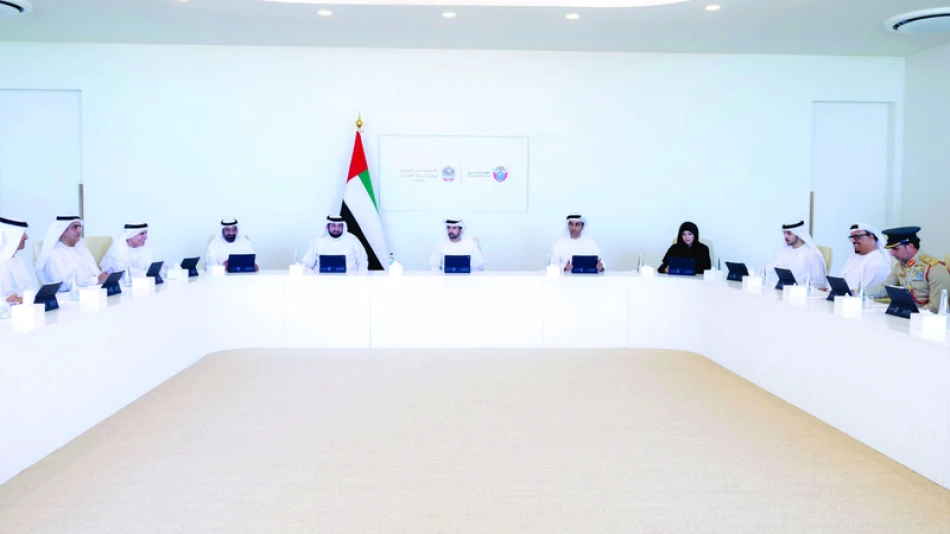
Dubai's Unparalleled Allure: Hamdan bin Mohammed Envisions a Sustainable, Prosperous Future
Dubai has unveiled an ambitious development plan worth billions of dirhams, targeting multiple sectors from aviation to healthcare as part of its vision to become the world's best and most beautiful city. The comprehensive strategy includes major investments in green spaces, aviation talent development, affordable education, and financial infrastructure.
Green City Transformation
The Dubai Executive Council approved a massive 18.3 billion dirham greening and parks strategy that will triple the number of trees in Dubai by 2040. The plan includes over 800 projects across the emirate, creating 310 new parks and developing 322 existing ones.
The initiative aims to put 80% of Dubai residents within a five-minute walk of a neighborhood park. This addresses a key urban planning challenge many global cities face - making green spaces accessible to dense populations. Dubai plans to achieve 187 square kilometers of total green space, equivalent to 11 square meters per person.
What makes this project particularly significant is its focus on sustainability. All irrigation will use 100% recycled water, and the strategy specifically targets reducing urban heat islands - a growing concern for cities in hot climates as global temperatures rise.
Aviation Talent Pipeline
Dubai launched the "Aviation Talents 33" initiative to cement its position as a global aviation hub. The program will create over 15,000 jobs and 4,000 training opportunities, while establishing partnerships with more than 30 international aviation companies.
This move comes as Dubai prepares for Al Maktoum International Airport to become the world's largest airport. The timing is strategic - the global aviation industry faces significant talent shortages, and Dubai is positioning itself to capture much of that value by developing local expertise.
The initiative uses AI-supported recruitment and training, reflecting how the aviation sector is embracing technology to solve workforce challenges. For investors and aviation companies, this represents a major talent pool in one of the world's busiest aviation markets.
Education and Affordability
The council approved policies to increase good schools with reasonable fees, targeting 60 new affordable schools by 2033. This will add around 120,000 new student seats while maintaining quality and diversity.
The policy offers incentives to investors, including reduced land rental fees for educational properties. This approach tackles a common issue in international cities - how to provide quality education without pricing out middle-income families.
Dubai's private schools currently serve about 400,000 students from various nationalities. The new policy aims to make Dubai one of the top 10 cities globally for education quality, which could strengthen its appeal to international professionals and families.
Sports and Financial Infrastructure
Dubai approved a comprehensive sports strategy through 2033, focusing on talent development and positioning the city as a global sports destination. The plan includes 19 programs and 75 initiatives across 17 priority sports.
In the financial sector, Dubai established a specialized Financial Restructuring and Bankruptcy Court to handle debt restructuring and bankruptcy cases. This institutional development supports Dubai's goal to rank among the world's top three financial centers.
The court addresses a critical need in financial markets - efficient resolution of distressed situations. This can boost investor confidence and make Dubai more attractive for complex financial transactions.
Healthcare Expansion
The council expanded early detection health services for Dubai citizens, targeting chronic diseases that account for 52% of deaths. The project aims to achieve a 40% increase in early detection rates for colon cancer and reduce appointment waiting times to seven days or less.
This preventive approach reflects a broader shift in healthcare systems toward early intervention rather than treatment after diseases develop. For Dubai, this could significantly reduce long-term healthcare costs while improving quality of life.
The initiatives support Dubai's Social Agenda 33, which aims to achieve a healthy life expectancy ranking among the world's top 10 cities. This comprehensive approach spans urban planning, education, healthcare, and economic development - showing how modern city planning increasingly integrates multiple sectors to achieve broader goals.
Most Viewed News

 Sara Khaled
Sara Khaled






